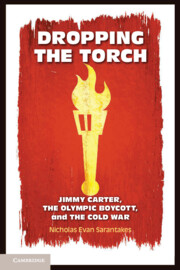Book contents
- Frontmatter
- Contents
- Acknowledgments
- Abbreviations
- Introduction Miracle on Ice
- Chapter 1 Lord Killanin and the Politics of the Olympics
- Chapter 2 Los Angeles versus Moscow
- Chapter 3 Jimmy Carter and U.S.-Soviet Relations
- Chapter 4 The Soviet Invasion of Afghanistan
- Chapter 5 The American Response
- Chapter 6 Easy Victories
- Chapter 7 Painful Losses
- Chapter 8 The White House Games
- Chapter 9 Coca-Cola, NBC, and the Defeat of the Iron Lady
- Chapter 10 The Vote in Colorado
- Chapter 11 Civil Wars
- Chapter 12 Carter versus Killanin
- Chapter 13 Moscow: The Olympics Are the Olympics
- Chapter 14 Los Angeles
- Chapter 15 Conclusion
- Epilogue
- Notes
- Bibliography
- Index
Chapter 2 - Los Angeles versus Moscow
Published online by Cambridge University Press: 05 September 2012
- Frontmatter
- Contents
- Acknowledgments
- Abbreviations
- Introduction Miracle on Ice
- Chapter 1 Lord Killanin and the Politics of the Olympics
- Chapter 2 Los Angeles versus Moscow
- Chapter 3 Jimmy Carter and U.S.-Soviet Relations
- Chapter 4 The Soviet Invasion of Afghanistan
- Chapter 5 The American Response
- Chapter 6 Easy Victories
- Chapter 7 Painful Losses
- Chapter 8 The White House Games
- Chapter 9 Coca-Cola, NBC, and the Defeat of the Iron Lady
- Chapter 10 The Vote in Colorado
- Chapter 11 Civil Wars
- Chapter 12 Carter versus Killanin
- Chapter 13 Moscow: The Olympics Are the Olympics
- Chapter 14 Los Angeles
- Chapter 15 Conclusion
- Epilogue
- Notes
- Bibliography
- Index
Summary
What Lord Killanin and the members of the International Olympic Committee did not know was that while they had been fighting public battles about the politics of participation in the Olympics over China, Taiwan, and South Africa, the United States government had already politically intervened in the movement. Done quietly, American officials attempted to influence the process in which the IOC selected the host city in an effort to bring the Games to the United States. This effort brought about a clash with the Soviets who were basically trying to do the same thing. The president responsible – personally responsible – for this confrontation was not Jimmy Carter, but Richard Nixon. This Cold War contest put the IOC right in the middle, bribes in the pockets of its members, and the Games of the XXII Olympiad in Moscow.
When Nixon entered office in 1969, a group of prominent individuals in the Los Angeles area were trying to bring the Olympics to California. The last time the United States had hosted the Summer Games was 1932. Ironically, the host city that year was Los Angeles. The USOC was interested in hosting the Games again. Since the 1940s, Detroit had been the designated bid city for the United States. In 1960, the United States hosted the Winter Games, which were again in California, in the resort of Squaw Valley. Repeated efforts to bring the Summer Olympics to Michigan were unsuccessful. In 1968, the USOC replaced Detroit with Los Angeles as the official American nominee for the 1976 Summer Olympics, and Denver for the Winter Games. The IOC would vote and make its decision in May of 1970.
- Type
- Chapter
- Information
- Dropping the TorchJimmy Carter, the Olympic Boycott, and the Cold War, pp. 32 - 45Publisher: Cambridge University PressPrint publication year: 2010

